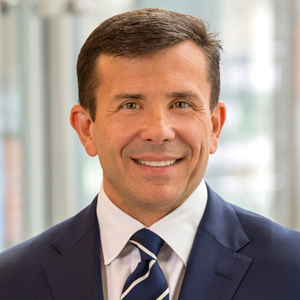Biotech entrepreneur, company founder, tireless patient advocate, and U.S. Navy combat veteran will guide the life science industry in its mission to feed, fuel and heal the world

December 5, 2023 | The Biotechnology Innovation Organization (BIO) is proud to announce that industry leader and military veteran John F. Crowley will be its new President and CEO, effective March 4. He will replace Rachel King, a longtime BIO board member and industry trailblazer who has served as BIO’s CEO on an interim basis for the past year.
Crowley is best known for his role as an entrepreneur in the biotechnology industry following the 1998 diagnosis of his two youngest children with Pompe disease, a rare and often fatal neuromuscular disorder. His children’s diagnosis inspired him to co-found a biotech company to develop a treatment that he credits with ultimately saving his children’s lives. The Crowley family journey was depicted in the major motion picture “Extraordinary Measures” starring Harrison Ford, Brendan Fraser, and Keri Russell. In 2005, Crowley went on to help found Amicus Therapeutics, a now 500+ person global biotechnology company, where he served as Chairman and CEO from 2005-2022 and is presently the company’s Executive Chairman. He will remain in that role until he transitions to BIO.
Crowley’s decades of biotech experience and deep passion for the field will be pivotal in helping BIO reimagine how the world thinks about drug development. He is a strong supporter of policies that empower innovation, enable entrepreneurship, and put patients first. Crowley also has been a leading voice globally for universal access to medicines, especially for children, people living with rare and other life-threatening diseases, and those with disabilities. As the father of two children living with a rare disease, he brings a unique understanding of the challenges patients, their families, and caregivers face, as well as the transformative opportunities that biotechnology presents to alleviate human suffering. This has been his life’s mission.
“In every role I’ve held in my life—biotech founder, U.S. Navy intelligence officer, husband and most importantly, father and grandfather—I have asked myself, ‘What is the mission?’” said Crowley. “When I founded our first company, the mission was to create a therapy to save our children and others from Pompe disease. Today, there are untold millions of children and adults waiting for ‘their’ cures and treatments – as well as literally billions of people who need agricultural advances and climate solutions that biotechnologies can provide. The mission of BIO is the mission of our members: cure patients, protect our climate, and nourish humanity. I am humbled and honored to lead BIO as we enter this golden age of medicine and the coming age of biotechnology. And I am eager to continue working alongside our members and dedicated BIO leadership and staff to drive this mission forward.”
BIO represents roughly 1,000 members, including members working to deliver new animal health, plant, microbial and biobased products of biotechnology to support food security and address climate change. “While my life’s work has centered on creating life-changing and lifesaving medical therapies, I am excited about advancing these critical issues in agriculture and the environment for our society, as well as growing the membership base that drives our mission,” said Crowley, a longtime BIO board member and current BIO Vice Chair. “BIO’s presence at this year’s United Nations Climate Change Conference – COP28 – will give us an exceptional platform to showcase our member companies’ great work.”
“Having worked alongside John for many years, I can attest to his unwavering commitment to patients. He possesses a lifelong dedication to service, whether fighting for his country, wisely negotiating on behalf of our companies in Congress, or advocating in hospitals on behalf of his children and patients with rare disease,” said BIO Board Chair Dr. Ted W. Love. “After an exhaustive search for the right leader, we were thrilled that John decided to take on this influential role. We can’t thank Rachel King enough for her willingness to come out of retirement to lead BIO during this transition. Her dedication has made it possible for us to find the right leader for the job, and we are delighted she will ensure a smooth transition until John assumes the role in early 2024.”
“I’ve had the pleasure of working with John for many years as a Board member, and for the past year as part of BIO’s leadership team,” says Rachel King, co-founder and former CEO of GlycoMimetics, Inc., who has been serving as BIO’s President and CEO since October 2022. “There couldn’t be a better person to lead our members in 2024 and beyond, and I look forward to continuing to work together to advance this incredibly important industry in its pursuit to change people’s lives for the better.”
King will continue to serve in her current role until March 4, when Crowley transitions into his new position at BIO.
##
About BIO
BIO is the world’s largest trade association representing biotechnology companies, academic institutions, state biotechnology centers and related organizations across the United States and in more than 30 other nations. BIO members are involved in the research and development of innovative healthcare, agricultural, industrial and environmental biotechnology products. BIO also produces the BIO International Convention , the world’s largest gathering of the biotechnology industry, along with industry-leading investor and partnering meetings held around the world. Good Day BIO is the only daily newsletter at the intersection of biotech, politics and policy. Subscribe here.
Learn More about John here: https://www.bio.org/about/bio-leadership/john-crowley

P: 404.221.0617
Fax: 404.448.3982
Email: admin@galifesciences.org
Address: 8607 Roberts Drive, Suite 250, Atlanta, GA 30350


